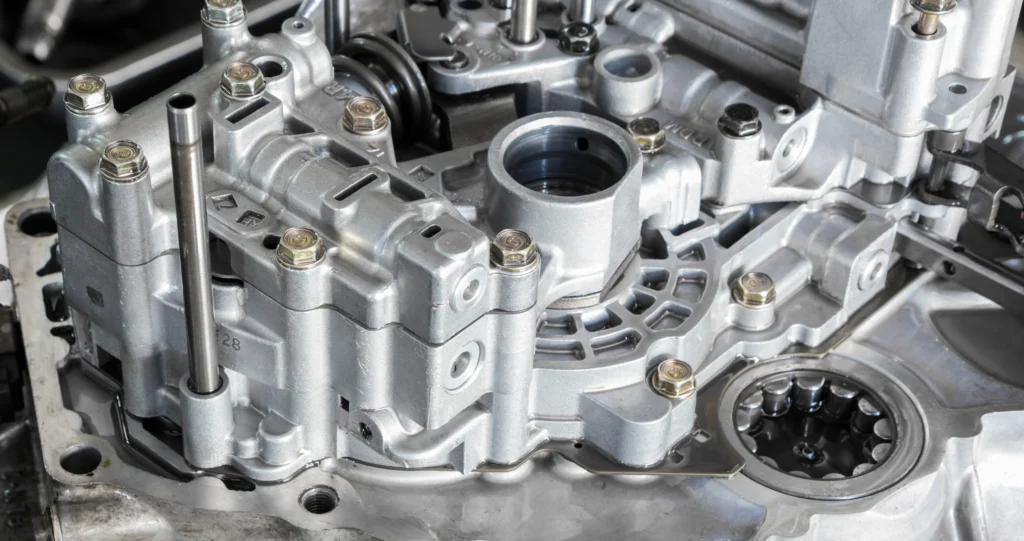In the world of automotive manufacturing, there are a few fabrication methods that really stand out. One of the most popular and impactful options is die casting. Die casting metals is the process of pouring molten metal into pre-made cavities, allowing the metal to cool, and pushing out the finished, solid piece of metal. It’s the best way to quickly and affordably make dimensionally-identical metal parts.
Our die-casting experts at Rapid Axis will take some time to explain why and how die casting helps the automotive industry in this quick guide.

High Production Efficiency
As you probably know, automotive manufacturers don’t have any time to waste — it’s an industry of tight turnarounds, large production throughput, and little room for mistakes. This is where die casting stands out. The die casting metals process allows you to make parts very quickly without sacrificing quality.
Its fast-paced nature allows you to hit your quarterly production demands and satisfy the market.
The efficiency of die casting is further enhanced by its capacity for producing complex shapes with minimal machining or tooling required.
Cost-Effectiveness for Large Production Runs
Another significant advantage of die casting metals in automotive manufacturing is its cost-effectiveness, especially for large production runs. Compared to traditional CNC machining, die-cast parts are often a fraction of the cost.
While the initial setup costs for die casting molds and machinery might be higher, these costs disappear over time as you create more units with each cavity.
As production volume increases, the cost per unit decreases, making die casting an economical choice for mass production. This affordability is a key factor for automotive manufacturers looking to maintain competitive pricing in the market.
High Strength-to-Weight Ratio
Automotive parts need to be lightweight, yet strong. As a result, designers like yourself need to consider material choices in whatever manufacturing option you settle on.
With die casting metals, you have access to lightweight and strong alloys of aluminum and magnesium, which will easily provide the durability and sturdiness that your parts need to achieve. All the while, these alloys will minimize the final weight of your vehicle.
Durability
Die-cast components are known for their durability. These parts are able to withstand harsh operating conditions and prolonged use. The alloys used in die casting are essentially the same as alloys used in traditional machining. With a good die casting manufacturer, you’ll also achieve solid parts with uniform thicknesses throughout. The result? Highly durable parts that will hold up to daily use on your designed vehicle.
This durability is crucial for automotive parts that are exposed to extreme temperatures, vibrations, and wear.
Improved Aesthetics
We understand that the automotive industry is largely performance-related, but there is still a big need for curb appeal. With die casting, you can achieve more aesthetically pleasing results with smooth final parts that can go through further finishing steps.
Since die casting doesn’t involve any cutting or shearing, you won’t have to clean up sharp edges or deburr parts.
Design Flexibility
Die casting is renowned for its design flexibility, which is great news for automotive engineers and designers alike. The process allows you to design intricate shapes and detailed features, which offers a freedom in design that you can’t get with traditional CNC machining.
This flexibility can open a lot of doors for you. Suddenly, you can further optimize the cost, performance, weight, and aesthetics of your vehicle, part by part.
Integration of Multiple Functions
Die casting allows for the integration of multiple functions into a single component. This reduces the need for additional parts and assembly, simplifying the manufacturing process and reducing costs.
Consistency and Reproducibility
Consistency and reproducibility are critical in automotive manufacturing, where every part needs to meet stringent quality standards. Die casting excels in producing parts with uniform quality and tight tolerances, ensuring that each component is virtually identical to the last.
This repeatability is essential for maintaining the integrity and reliability of automotive components, contributing to the overall safety and performance of the vehicles.
Environmental Sustainability
Die casting is relatively more environmentally friendly compared to some other manufacturing processes. This is mostly due to the fact that each unit comes with very little waste (if any), and the materials used are almost infinitely recyclable with no decline in performance.
This leads to a more eco-friendly manufacturing process.
Rapid Axis Can Handle All of Your Die Casting Metals Needs
As you just learned, die casting metals offers a ton of advantages for automotive manufacturing, ranging from high efficiency and cost-effectiveness to design flexibility and consistent quality. These benefits make die casting an incredibly powerful process in the production of your automobiles.
For great die casting results, consider a partnership with Rapid Axis. Our exceptional team of manufacturing experts can help you create your automotive parts. Our full-service shop offers traditional CNC machining, die casting, and sheet metal work, plus dozens of different finishing steps to help you achieve the perfect part. Get a free quote today.
